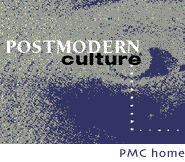Notices: Conferences, Calls for Papers, Submissions
Volume 11, Number 3
May, 2001
Goth Subculture: Collection
Contributions are sought for a proposed collection of essays on goth subculture to be edited by Lauren M.E. Goodlad, Michael Bibby, and Michael du Plessis. We are especially interested in ethnographic and/or theoretically informed cultural analyses of goth music, goth club culture, goth material culture (clothing, makeup, practices of everyday life), goth Internet culture, goth style in mainstream popular culture (e.g. Tim Burton's films, MTV, fashion advertising), goth literature (e.g. Poppy Z. Brite, Storm Constantine), goth in global and transnational contexts, and recent mass-mediated anxieties about youth deviance, violence, and goth cultures. Send completed essays of not more than 25 pages by June 1, 2001, to:
Michael du Plessis
Comparative Literature and Humanities
Campus Box 331
University of Colorado at Boulder
Boulder, CO 80309-0331
Kchapg@cs.com
(303) 492-8406
Please send a copy of your paper on disk in Microsoft Word or another IBM-compatible format.Back
M/C: A Journal of Media and Culture--"Sick" Issue
Call for Contributors
M/C: A Journal of Media and Culture is looking for contributors for its latest issue, "sick".
M/C is a crossover journal between the popular and the academic and is a blind- and peer-reviewed journal. To see what M/C is all about, check out our web site, which contains all the issues released so far, at http://www.api-network.com/mc/. To find out how and in what format to contribute your work, visit http://moby.curtin.edu.au/~ausstud/mc/contrib.html.
How Sick are You?
In this issue of M/C, we investigate the cultural manifestation of sickness in all of its varied forms. To be sick is to be marginalized in a number of ways: sickness is a central object in the discourses of moral conservatism, of biology and medicine, of social control and disapproval. But "sick" is also now a slightly outdated slang term of commendation. These functions operate separately, but also feed off one another.
We invite articles that address the discourse of sickness and its moral, mental, physical, and cultural manifestations. Is a "sick" text a manifestation or dimension of that sickness? What makes a text "sick"? How have discourses and manifestations of sickness changed over time, and how does this change our reading of "sick" texts from earlier historical periods, especially when an older text is reconstructed in a new modern format through the magic of film or television?
If you want to be part of the sickness, send your articles to the issue editors:
Nick Caldwell: n.caldwell@mailbox.uq.edu.au
Catriona Mills: c.mills@mailbox.uq.edu.auArticle Deadline: 14 May 2001
Issue Release Date: 13 June 2001
Back
Conferences, Calls for Papers, Submissions
THIS ARTICLE AND OTHER CONTENTS OF THIS ISSUE ARE AVAILABLE FREE OF CHARGE UNTIL RELEASE OF THE NEXT ISSUE. A TEXT-ONLY ARCHIVE OF THE JOURNAL IS ALSO AVAILABLE FREE OF CHARGE. FOR FULL HYPERTEXT ACCESS TO BACK ISSUES, SEARCH UTILITIES, AND OTHER VALUABLE FEATURES, YOU OR YOUR INSTITUTION MAY SUBSCRIBE TO PROJECT MUSE, THE ON-LINE JOURNALS PROJECT OF THE JOHNS HOPKINS UNIVERSITY PRESS.

